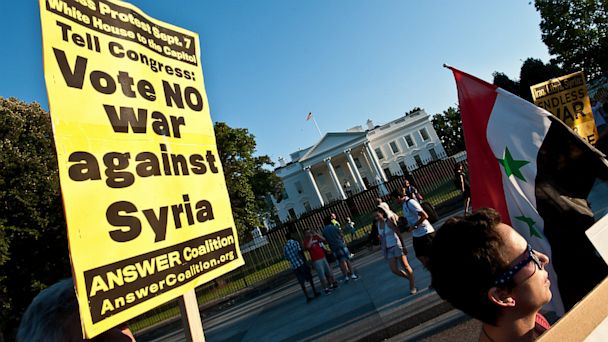Why Obama Doesn't Have Congressional Support on Syria - Yet
After this week's full-court press by top Obama administration officials, including Secretary of State John Kerry and Secretary of Defense Chuck Hagel, one thing is clear: The president does not yet have the votes to authorize a military strike on Syria. Indeed, he has a long way to go.
Such an assessment is based on the ABC News Political Unit's latest count of where the votes stand in the House and Senate, a broad canvas of public comments by 433 voting House members and 100 voting senators, plus ABC News' own reporting.

Nicholas Kamm/AFP/Getty Images
The numbers will likely shift quite a bit by the time Congress votes on military intervention, which could happen as early as the middle of next week in the Senate. Many lawmakers are undecided or have yet to make their positions known.
But here are five key takeaways based on the count as it stands now:
1. President Obama does not have the votes to pass a resolution in either chamber, but he faces the biggest challenge in the House. According to ABC News reporting, the situation is more dire in the House than the Senate, although he does not have anywhere near a majority of committed or leaning votes in either chamber of Congress, at least if members' public statements are to be believed. And in the House, where more than 200 members are on record as opposing, or leaning toward opposing, the use of force will make efforts to find a majority exceedingly difficult. It takes 217 votes to pass or block action in the House, based on the number of members.
2. Obama can blame Republicans. The vast majority of Republicans who've made their feelings known so far oppose military action against Syria, marking a major shift in the GOP's foreign policy ideology since the Bush era. This partly reflects a growing and increasingly influential libertarian wing in the GOP that's skeptical of any foreign intervention (not surprisingly Sen. Rand Paul, R-Ky., has been an outspoken critic of a strike). It also stems in part from the fact that this is a Democratic president with an anti-war history asking a divided Congress to act. It's sometimes tough to disentangle the anti-Obama sentiments from the anti-Obama-agenda sentiments, even when that agenda would more closely align with, say, a Bush foreign policy than perceptions of an Obama one. But if Republican members of Congress were to vote as they would have been expected to vote under President George W. Bush, and he were to have asked for the same authorization, this vote would not be anywhere near as close as it's going to be.
3. Obama can also blame Democrats. Among those who need convincing, and might not ever be convinced, is a liberal wing in the Democratic Party that has had its perceptions colored by the Iraq War. These members of Congress (think Rep. Raul Grijalva, D-Ariz., co-chair of the Congressional Progressive Caucus, and several of its members like Rep. Barbara Lee, D-Calif.) are skeptical of both intelligence on chemical weapons, and the United States' ability to quickly change the course of a Middle Eastern conflict without getting bogged down. More general liberal disenchantment with the Obama administration is fueling the severe skepticism on whether this is the right path. With liberal groups threatening primary challenges against Democrats who support President Obama, the only real fear of electoral backlash among members of Congress is coming from the left. And the vaunted Obama "army," the reconstituted pieces of his campaign apparatus working for the Obama agenda, is notably silent.
4. The president himself will need to make the case. If there's one united theme coming out of Congress, it's that President Obama needs to make the case directly and aggressively to the American people. The bottom line is that the public doesn't want this, and until or unless lawmakers sense that changing, they're not going to support the president's pitch for military intervention in Syria. ABC News-Washington Post polling out this week found that 59 percent of the public opposes missile strikes in Syria, while just 36 percent support them. Based on anecdotal evidence, the feedback members of Congress are getting is even more lopsided: The anti-intervention voices are far louder, and far more willing to contact their members of Congress, than those on the president's side. All of this might be why there are more signs Obama is considering a high-profile address to the nation, according to top lawmakers and administration officials.
5. None of this means the president won't get the authorization he's seeking. Indeed, it's premature to suggest any resolution will fail. Most close observers, and even some leading opponents of intervention, concede that the president will most likely get where he needs to go. But he and his allies are going to have to make a very hard sell and, again, the public end of this will be critical as he seeks to move the needle on Capitol Hill.
ABC News' Michael Falcone and Chris Good contributed reporting.